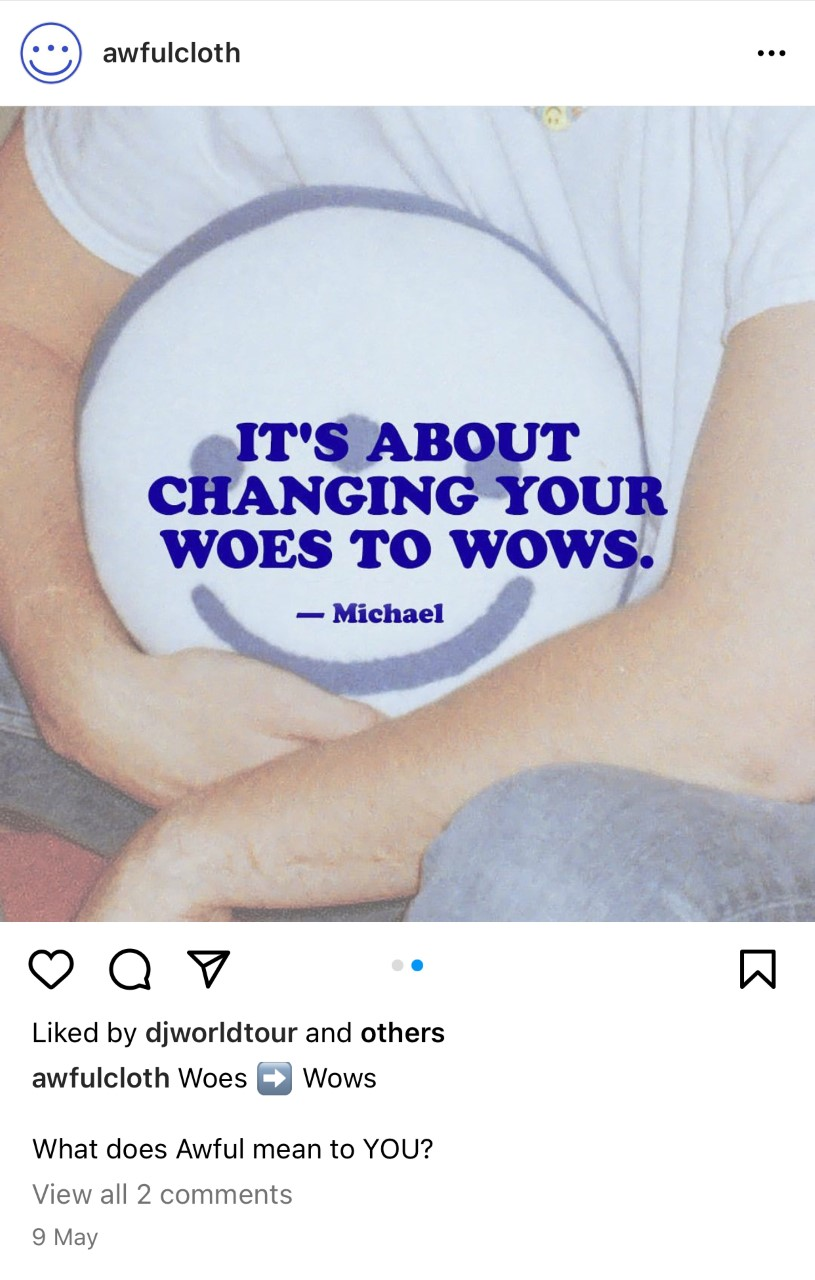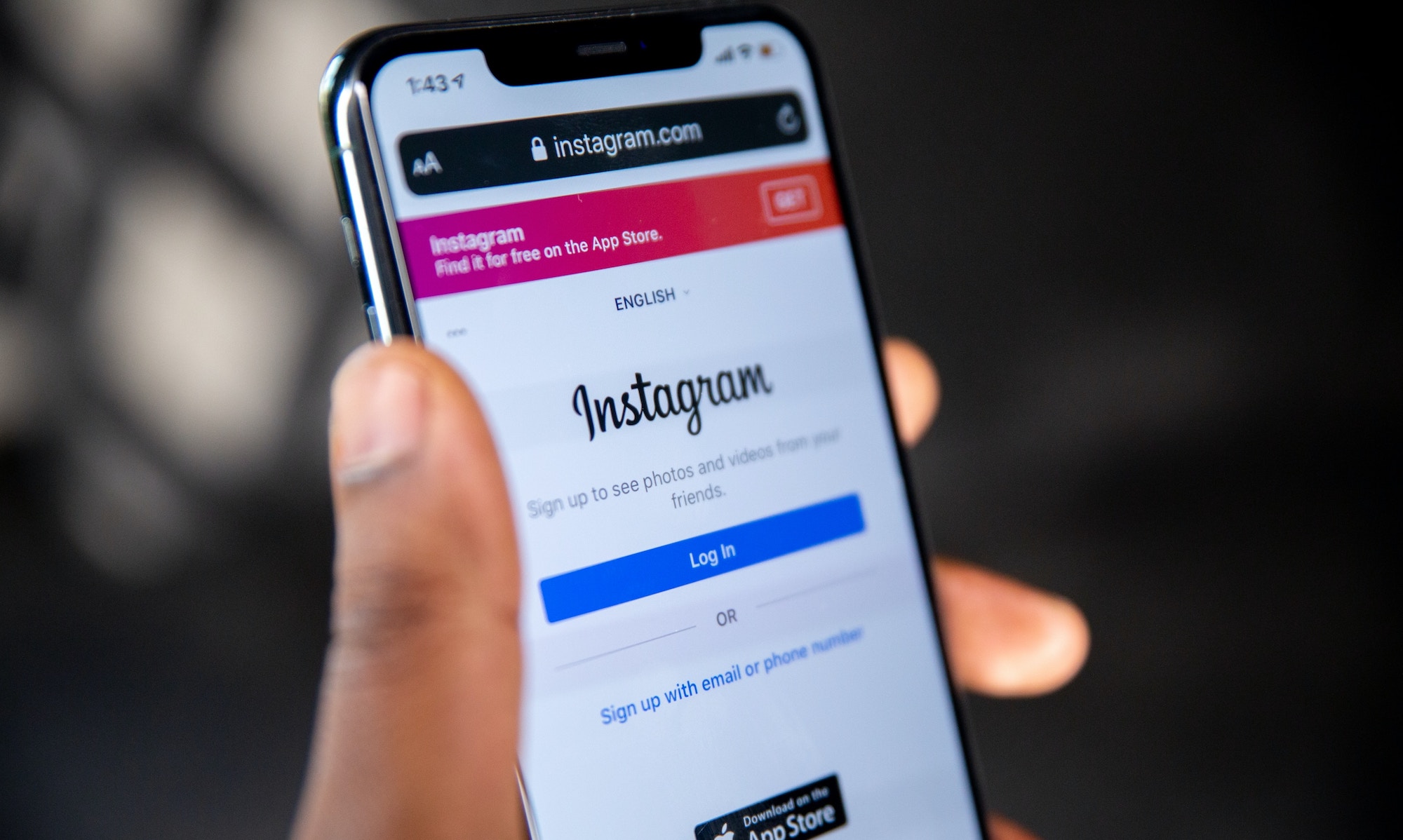How Awful Cloth grew a mindset brand through organic creator relationships

Listen to this episode:
Fact: Everyone likes to wear hoodies.
Fact: Everyone wore hoodies during the pandemic.
Fact: We all love expressing ourselves in different ways.
Fact: Everyone can do with a little positivity in their day-to-day lives.
Combine all these attributes, put them into a wishing well, and what do you get? An optimistic brand that sells positivity-focused clothing, writes Monday motivation quotes, and sells really bright and happy hoodies.
Sounds Awful, right? Or rather, full of awe?
I sat down with Charles (Chaz) Zayed and Emmit Flynn from Awful Cloth to learn about their brand, its messaging, and their strategy for expanding to over 70 countries while in the middle of a pandemic. Here’s what we discussed.

This interview has been edited and condensed for clarity.
Banknotes: What’s the inspiration behind Awful Cloth? How did you get the idea?
Zayed: Awful means “full of awe.” It's about finding the good within the bad. We're a positivity brand that focuses on optimism. In life, if you accept the negative in a situation, that's what you're likely to receive. But if you're optimistic and try to be positive, you're more likely to receive the good out of a situation. So, looking at the word awful, do you see it as bad, or full of awe?

Banknotes: What does it mean to be a mindset brand?
Flynn: Chaz and I were described as optimistic and outgoing by many people when we were younger. So when we started Awful, it was important for us to include optimism as a central part of the brand. Like Chaz said, what you perceive is what you recieve.
We promote this philosophy with everything we do, like our social media, email campaigns, and influencer partnerships. We're big on bright, fashionable designs, so a lot of people come to us for really bright, colorful, exciting clothing—stuff that's a little bit more fun than the minimalist options.
We also promote positivity through our "Energy Cards", cards filled with positive energy that our customers can pass along to friends and family, or strangers. We encourage people to pass it on, be it to your barista or someone at the gas station.
Banknotes: What activities did you do to build a community?
Flynn: We focus on organic community building by staying connected with our audience through social media and email newsletters, and by partnering with people who resonate with our brand. This has worked so well for us that we've never paid an influencer to wear our clothes!
Zayed: We do “Mindset Mondays,” where we email weekly quotes to make our audience see the day a little differently. We also do a really good job of engaging with people through direct messages or comments.

Banknotes: Since you’re not paying influencers, how do you build relationships with them?
Zayed: We don’t try to act formal with influencers and we don't push them for just our agenda. Instead, we keep it natural by asking if we can send them some products without asking for anything in reeturn. This strategy has worked to convince big names like Jason Derulo and Charli D'Amelio to work with us. Last year, we went to Los Angeles to meet up with a few influencers to do shoots and give them some hoodies. This helped cement those relationships because they see we are two guys running a clothing brand and not just a big old corporation.


Flynn: We try to keep it organic. People also tend to appreciate our brand name and the philosophy behind it. I think a big part of why the mindset brand and the positivity resonates with them is because people recognize it's not easy to be positive all the time. We don't go around saying, “Oh, just be positive. It's effortless." We believe it's something you have to work towards.
We’ve also noticed that, although there are negative aspects of social media and it can be very overwhelming and anxiety-inducing, our generation has gone from being perfect online personalities, to people who have become very open and honest about their struggles.
Zayed: A lot of our influencers come from TikTok since the app has become more genuine than Instagram. As opposed to 2D photos that don’t reflect personalities, TikTok features people joking, dancing, and showing their true selves.
Banknotes: Tell me more about your growth journey
Zayed: We began Awful Cloth when we were in college, so we had our college communities as our audience. I had fraternity brothers and people at school who would buy hoodies and shirts. We then looked at TikTok which had influencers who were still building their own audience. So, we were able to have Charlie D’Amelio, Bryce Hall, and Nia Sioux wear our hoodies early on.
That's where social media fashion started for us. People saw their favorite influencer wear our hoodies, and came back to our brand. It was all organic too, since the influencers didn’t have the ad hashtags. Soon, other influencers started to reach out to us. And when the pandemic happened, everyone was on TikTok, and that’s when we grew.
We also had a lot of time during the Covid break, and we were able to hone our business, learn about fashion, improve our products, and fine-tune our social media and websites. When we graduated, we got an office space in Brooklyn in the DUMBO area. We call it Aw-ffice. We have some big plans for the future to grow our brand and to be recognized in the fashion world.
Banknotes: Do you do pop-ups? How do they work?
Flynn: We're mostly e-commerce, so we don't have a physical retail space, but we've done popups and collaborations with physical stores. In fact, we just collaborated with a gym called Solidcore for their merchandise in all their U.S. locations. We've also done popups at events.
Our first was at the Indiana University gay pride parade, where our popup stand was just a table and a big banner. We really like to do those because people usually respond very well to them.

Banknotes: Can you elaborate on the idea of social media fashion?
Flynn: If you look at Kadarshian-level influencers, they’re famous because they’re perfect. However, TikTok influences are often famous because they’re just regular people, like you and me. And that’s the appeal of TikTok fashion because it shows how people are expressing themselves in their day-to-day clothes.
When we sent hoodies to Charli D’Amelio, we didn’t see her wear them for a long time. But she chose to wear our hoodies during quarantine, at a time when most people were wearing comfortable loungewear. When people saw that, they recognized it as an expression of herself, especially since the videos of her in our hoodies were not ads.
Zayed: It's all very trendy. TikTok is where the first people started doing trends, and a small thing like that made a big fashion statement. The app allows you to express yourself a little differently. Trends can come and go, but hoodies are ingrained into people's everyday looks.
Banknotes: What kind of eCommerce best practices would you recommend to other brands who are looking to get started?
Zayed: The first thing is creating an account on all social media platforms in a way that connects everything together. Your website should be linked to your social media pages and vice versa. As for the website, try to make it easy to navigate. Putting too much onto a website can get nauseating for people. Today, people just want simplicity. They just want to see what you have to offer.
Flynn: When we were first building our brand, we didn't have many sales, just our family and friends trying to support us. But we still treated it as if we were very successful. We focused on creating consistent social media posts, and being active on all platforms, as if we had a significant following already.
So when we did start getting a lot of influencers and famous people wearing our clothes, we had already done so much work beforehand that it was very easy to direct people to where to go. We created the brand first, with its meaning and message, and when it took off, we were ready for it.
Banknotes: How is success looking for Awful cloth?
Flynn: We’ve gone from being a small town brand, to selling to customers all over the country, and the world. We have hoodies in all 50 states, and in 72 countries. A lot of that is thanks to collaborations. Recently, we did a great collaboration with Barstool Sports for Black Friday, where we made their number one selling hoodie of the holiday. That is something we are really proud of.

We've worked with other people too. Solidcore is another collaboration we’re really proud of because it had a great message. We're working on a few more New York-based collaborations too, which we will roll out by mid-August 2022.












.jpg)
.jpg)






.jpg)
.png)



.png)
.jpeg)

























































.jpg)

























